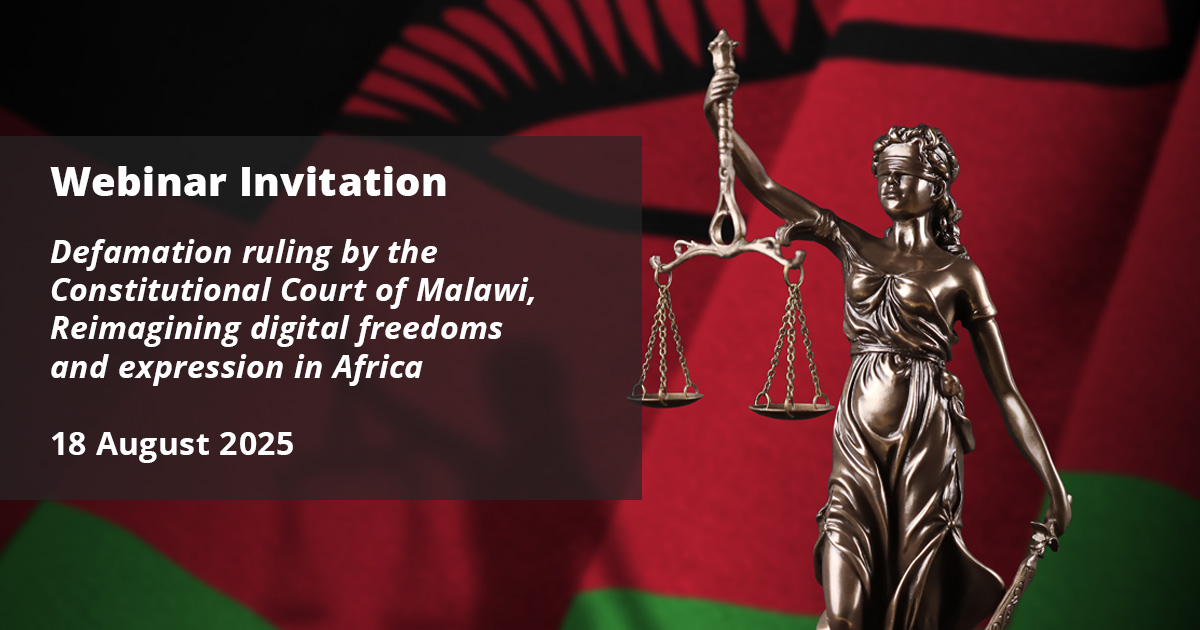The Centre for Human Rights, Faculty of Law, University of Pretoria, invites you to a webinar exploring the implications of the Constitutional Court of Malawi’s landmark ruling decriminalising defamation. This decision marks a pivotal moment in the advancement of freedom of expression and digital rights across Africa, particularly in light of the growing trend of online censorship and digital repression in conflict-affected contexts.
Event Details
Date: 18 August 2025
Time: 10:00 SAST
Platform: Zoom
Registration
All participants are required to register on zoom.
Background
In July 2025, the Constitutional Court of Malawi handed down a historic judgment in Joshua Chisa Mbele v The Director of Public Prosecutions & The Attorney General [2025] MWHC (Constitutional Referral No. 2 of 2024), declaring Section 200 of the Penal Code unconstitutional. This ruling marks a pivotal moment in the advancement of freedom of expression and digital rights across Africa, as it affirms that limitations on online speech must be narrowly tailored, lawful and proportionate, in line with constitutional and international human rights standards. By striking down overly broad provisions that criminalise “offensive” or dissenting speech in the digital space, the Court has sent a strong message against the suppression of online civic engagement. This ruling therefore strengthens the jurisprudence on freedom of expression and digital rights on the continent, paving the way for more open, inclusive and democratic online spaces across Africa.
In a bold and progressive decision, the Court, in July 2025, declared Section 200 of the Penal Code unconstitutional, effectively decriminalising defamation in Malawi. The provision had previously made it a criminal offence to publish defamatory statements, exposing individuals to prosecution and imprisonment. The Court held that civil remedies are sufficient to address reputational harm and that criminalising defamation constitutes an unjustifiable restriction on free speech. This ruling, which took immediate effect, prohibits any further prosecutions under Section 200 and sets a powerful precedent for other African jurisdictions grappling with outdated and punitive defamation laws.
Continental relevance
This ruling also comes at a time when the African Commission on Human and Peoples’ Rights (ACHPR) has adopted two transformative resolutions, ACHPR/Res.631 (LXXXII) 2025 and ACHPR/Res.630 (LXXXII) 2025, which aim to:
- Promote public interest content in digital spaces;
- Strengthen information integrity through independent fact-checking;
- Encourage human rights impact assessments by technology companies; and
- Ensure freedom of expression remains protected amid digital regulation.
Together, the Malawi decision and these ACHPR resolutions signal a growing continental commitment to reimagining digital spaces as platforms for truth, accountability, and democratic participation.
Objectives
This webinar aims to:
- Unpack the legal and human rights significance of the Malawi defamation ruling
- Explore its implications for digital rights and freedom of expression across Africa
- Situate the ruling within broader trends of democratic regression, online censorship, and digital repression
- Discuss strategies for leveraging jurisprudence and soft law instruments to advance digital freedoms
- Encourage cross-sectoral collaboration to promote rights-based digital governance
Paanel
Keynote speaker
- Hon Commissioner Ourveena Geeresha Topsy-Sonoo, Special Rapporteur on Freedom of Expression and Access to Information in Africa.
Moderator
- Tendai Mbanje
Project Officer, Expression, Information and Digital Rights Unit
Speakers
- Redson Kapindu
(Judge-in-Charge, Financial and Economic Crimes Division, High Court of Malawi; Visiting Professor of Law, University of Johannesburg) - Panji Winston Chirwa
(Deputy High Commissioner (Deputy Head of Mission) for Malawi to the Republic of South Africa) - Wesley Mwafulirwa
(Lawyer)
For more information, please contact:
Tel: +27 (0) 713362225
henok.kremte@up.ac.za
Tel: +27 (0) 12 420 4199
Hlengiwe.Dube@up.ac.za




